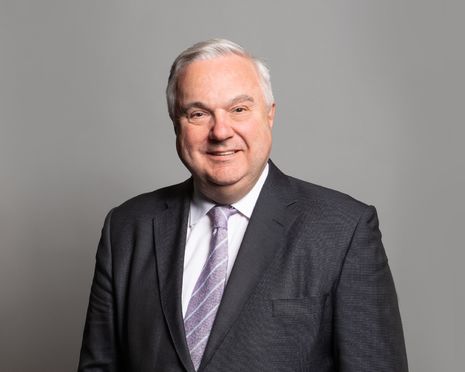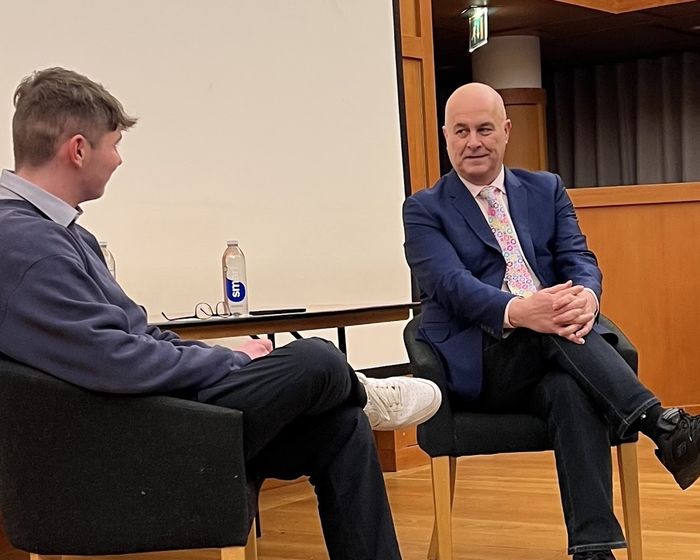Sir Oliver Heald: ‘Margaret Thatcher was somebody who gave you her full attention’
Lois Kildea speaks to the Remain-backing Conservative MP about reacting against the political establishment and his party’s electoral prospects

Recently, Sir Oliver Heald, the Conservative MP, returned to his alma mater to speak to Pembroke Politics Society. Afterwards, I spoke to him in a room which he told me, noticeably unenthused, had housed the college’s photocopier while he studied law there in the early 1970s.
Our conversation began with Heald proudly recalling his role leading the first campaign for co-residency at Pembroke, during his second year. Heald’s effort “narrowly missed” approval from the fellows despite having produced “a major report” on why the college should admit women. A decade later, the college moved to his position and began to admit female students. When I comment that Heald was “ahead of his time” on the issue, he laps it up, asserting that “I definitely was.” Some may be sceptical, but Heald is adamant that the Cambridge environment prepared him for a political career.
As Heald, a former member of the Cambridge University Conservative Association (CUCA), shares his student political experiences, I notice that his partisan identity was formed prior to arriving at university. Therefore, I ask how he knew he was “blue” so early on. At first, his reasons were generic and unconvincing (“I was the youngest person on the school council”) but, with a bit of encouragement, he admits to having been swept up by the “great battle of ideas” of the 1970s. While Labour were “dragging their feet” on the prospect of joining the EU’s predecessor organisation, the EEC, “Ted Heath laid out a vision for Britain going forward as part of Europe.”
“Young people will naturally look at the establishment and ask ’Is that what I want?”
Heald explains that, unlike today, during the late 1960s ‘The Establishment’ was the Labour Party. From his teenage perspective, the Wilson years were characterised by “indecision and difficulty for our country”, deplete of any modernising ideas, since “almost all” Britain’s “major industries” were already nationalised. “The case for deregulating and possibly privatising some [industries] was becoming increasingly convincing.” Furthermore, Heald found inspiring the relationship between Thatcher — “somebody who gave you her full attention” — and her deputy Willie Whitelaw, who was able to challenge her and channel her charisma.
After graduating, Heald practised as a barrister, spending his spare time at “Speaker’s Corner with the Hyde Park Tories.” By 1992, Heald had swapped representing people in the courtroom for representing the people of North East Hertfordshire in the Commons. Since then, Heald became “one of the first members of the Conservative Environment Network” and has served in the Major government, and, most prominently, as Solicitor General for England and Wales in the Cameron-Clegg coalition.
Given Heald’s legal background, I ask him how to fix the court system and cut-down the backlog of cases, which has more than doubled, rising beyond 60,000, since 2019. He explains that more electronic technology can be used to boost efficiency but that tackling the backlog will require the recruitment of more judges and lawyers. When I suggest that present pressures may be linked to budget cuts made quietly by a government he was in a decade ago, Heald declines my offer to reflect on past decisions, and instead stresses the crippling impact of the pandemic.
“I believe there is a good future... I am always optimistic”
Midway through our conversation, Heald affirms that Liz Truss was right to prioritise a higher rate of economic growth. Though he was unconvinced by the means she chose to achieve it, Heald’s comment made me wonder about his understanding of the effect of economic growth on the environment, one of his long-standing interests. However, as I try to unpick his comment, Heald preempts me, and interrupts: “Last election, I read [the Green’s] manifesto and it talked about ‘shrinking’ — not rethinking — the economy, or least that’s the way I read it.” Alas, I interpret Heald’s remark to mean that a nuanced discussion about the market’s role in a green transition isn’t to be had.
Since returning to the backbenches in 2017, Heald the “Europhile” has co-chaired the UK-EU Parliamentary Partnership Assembly, a new body formed to find areas for cooperation post-Brexit. One of the Assembly’s proposals — a ‘green lane’ allowing goods to travel between Great Britain and Northern Ireland free of customs checks — has now been announced as part of the Windsor Agreement. The agreement is intended to replace the Northern Ireland Protocol and restore some warmth to the UK’s relationship with our continental neighbours.
Before we finish, I prompt Heald to pitch why we, as Cambridge students, should vote for his party at the next election. “Well, we’ve tackled some of the worst problems that the country has faced since the Second World War, and I believe that we, by and large, made the right decisions.” Heald’s tone grows sombre as he returns to an earlier comment: “looking to the future, young people will naturally look at the establishment and ask ‘Is that what I want? Can we do better?’” With this reflection, it appears to me as though Heald is acquiescing to the Conservative’s dwindling popularity among younger generations. However, he quickly retrieves his earlier confidence, to conclude by reminding me that “we’re still coming out of these huge dramatic events, but I believe there is a good future… I am always optimistic, the glass is half full.”
 News / Cambridge academics stand out in King’s 2026 Honours List2 January 2026
News / Cambridge academics stand out in King’s 2026 Honours List2 January 2026 Comment / Plastic pubs: the problem with Cambridge alehouses 5 January 2026
Comment / Plastic pubs: the problem with Cambridge alehouses 5 January 2026 News / Cambridge businesses concerned infrastructure delays will hurt growth5 January 2026
News / Cambridge businesses concerned infrastructure delays will hurt growth5 January 2026 News / AstraZeneca sues for £32 million over faulty construction at Cambridge Campus31 December 2025
News / AstraZeneca sues for £32 million over faulty construction at Cambridge Campus31 December 2025 Interviews / You don’t need to peak at Cambridge, says Robin Harding31 December 2025
Interviews / You don’t need to peak at Cambridge, says Robin Harding31 December 2025









